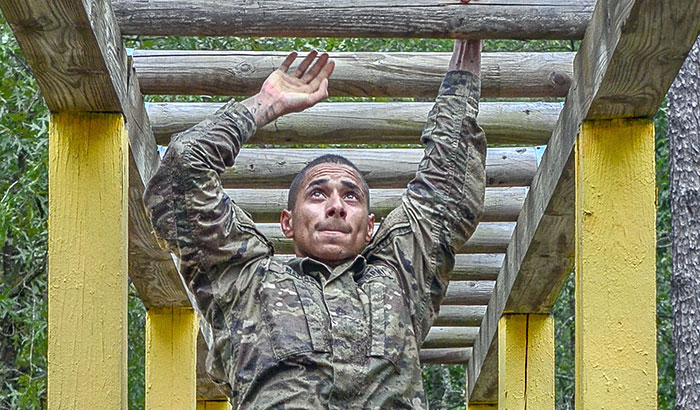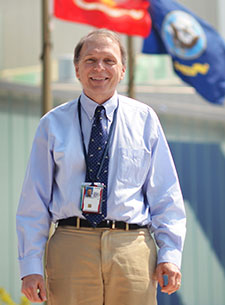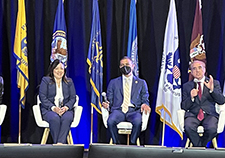Office of Research & Development |
 |


Army Staff Sgt. Miguel Matias, with the 82nd Airborne Division, navigates an obstacle at Fort Bragg in July 2018. A new effort will merge VA data into the military-funded Millennium Cohort Study, for a more complete picture of service members' and Veterans' health outcomes over time. (Army photo by Spc. John Lytle)
August 9, 2018
By Mike Richman
VA Research Communications
"VA data will provide a more valid clinical diagnosis than the self-reporting from the MCS survey in Veterans."
Nearly two decades ago, the Department of Defense launched a groundbreaking survey to evaluate the long-term health impacts of military deployments on members of the armed forces. The Millennium Cohort Study has since tracked the health of more than 200,000 service members through a self-administered survey and DoD health records.
From the start, VA and DoD researchers collaborated on the design of the Millennium Cohort Study (MCS), with VA officially designating it a study under its Cooperative Studies Program. The researchers also aimed to incorporate VA data into the study. Doing so, they believed, would strengthen the database and lead to better health outcomes for both service members and Veterans.
That time has arrived.

Dr. Edward Boyko is an epidemiologist and internist at the VA Puget Sound Health Care System. He is VA's chair on the Millennium Cohort Study. (Photo by Christopher Pacheco)
Sometime in the coming months, VA and DoD officials will sign a deal calling for VA data on health outcomes and disabilities, among other information, to be merged with data collected in the Millennium Cohort Study and the related Millennium Cohort Family Study. The family study tracks the health of spouses of service members and Veterans, including some spouses who have served in the military.
This rich bank of data will be housed at the Naval Health Research Center in San Diego, which is the DoD entity that runs the MCS. VA investigators will be able to access the data via the VA Cooperative Studies Program.
Dr. Edward Boyko is an epidemiologist and internist at the VA Puget Sound Health Care System in Washington state and VA’s chair on the Millennium Cohort Study. He says the goal of the merger is twofold: to help VA and DoD researchers and clinicians learn the most effective ways to protect service members from long-term health problems, and to make the researchers and clinicians more aware of the ties between military experiences and long-term health outcomes.
“The VA data will show what characteristics make people more or less likely to have adverse outcomes from military service,” he says. “There are force-readiness issues like being mentally, physically, and emotionally ready to deploy that I always hear discussed at MCS meetings. DoD is interested in using discoveries from MCS to achieve maximum service member health and fitness, thereby ensuring the most ready and capable military that is possible.”

VA Study Documents Health Risks for Burn Pit Exposures

Under Secretary of Health, panel of experts discusses PACT Act impacts for Veterans

Self-harm is underrecognized in Gulf War Veterans

Veteran interest in Gulf War Illness reflected in new research study
Boyko thinks the merger will benefit VA researchers because they’ll have access to MCS data.
“As VA investigators learn about the availability of VA data being merged with Millennium Cohort Study data, I think that will create more research opportunities and will draw in more investigators,” he says. “It’s also possible that if VA puts out a research request for proposals focusing on MCS data, that will also lead to a lot more investigators being actively involved.”
VA researchers, he adds, will have the chance to analyze how VA health care is used in relation to combat and other deployment exposures. Those are the main exposures in the MCS that researchers are interested in, he says.
Boyko says the MCS, with more than 200,000 participants enrolled, is the largest military health study ever. He knows of no other medical research study that is collecting the same volume of data. It will also be the largest DoD study that includes VA data, he notes. (VA’s Million Veteran Program is well on its way to collecting data on 1 million Vets. But MVP is not a single study. It’s a health and genomic database on which many different studies will be based.)
MCS, launched in 2001 prior to 9-11, collects health data on service members during their military careers and after they’ve left the service. Every three years, those who are enrolled in MCS are sent a survey, which asks for clinical diagnoses and subjective measures of symptoms and health. More than 100,000 MCS participants have served in the conflicts in Iraq and Afghanistan.
MCS officials originally aimed to follow-up with service members for 21 years but now plan to follow everyone who is enrolled for 67 years.
An estimated 10,000 service members and their spouses are enrolled in the Millennium Cohort Family Study, which was launched in 2011 and will also follow participants for 67 years. About 90 percent of the spouses are female.
Boyko says self-reported data lack the same accuracy as data obtained from medical encounters at VA’s outpatient clinics and from hospital discharge summaries. He believes the VA information will strengthen the ability of MCS to assess health outcomes of active-duty military members and Veterans in multiple ways.
“VA data will provide a more valid clinical diagnosis than the self-reporting from the MCS survey in Veterans,” he says. “Also, support for a diagnosis can be sought in VA data from laboratory and pathology tests or imaging studies. VA data will also provide information about diagnoses that are not included in the MCS survey. Plus, health care use at VA medical facilities can be examined to assess the economic and personal burden of medical conditions in much greater detail than what could be assessed from the MCS survey. This would include identification and assessment of traumatic brain injuries.”
Dr. Alyson Littman, an epidemiologist at VA Puget Sound, is one of a number of VA researchers who have carried out studies using MCS data. She has studied attrition from the MCS and has analyzed whether that attrition results in bias in studies. She has also explored how behaviors change around the time of military separation—for example, lifestyle habits relating to weight gain.
The data merger is “fantastic,” she says, because it provides opportunities to better understand health outcomes in Veterans from circumstances related to their days in the service.
“Merging the survey data with VA use and behavioral data will provide many new research opportunities,” Littman says. “Most studies that have pre-deployment data are small, come from a single site, or have only short follow-up—or all of the above. This merger will allow for large longitudinal investigations of outcomes, while focusing on factors that were present before deployment.”
She adds: “The merger will allow us to investigate outcomes not currently assessed in the MCS, or outcomes that may not be fully understood. We’ll be able to investigate outcomes related to health care use. We’ll also have the chance to obtain data on people who drop out of the MCS, meaning they don’t complete surveys.”
Boyko has contributed to many of the dozens of MCS data-based studies that have been published in leading academic journals. Those studies have looked at the effects of military deployment and combat exposure on mental and physical health, the impact of behaviors and resilience, and long-term disability. Resilience is the ability to adapt in a positive manner to a stressful or negative experience.
Many analyses that are based on the Millennium Cohort Family Study are in progress, and Boyko expects a steady stream of those papers to appear soon in academic journals.
In recent years, VA has been supporting MCS researchers. The first joint publication resulting from this support was published last year. It focused on whether the pattern of PTSD symptoms over time in active-duty military personnel is similar to that in Veterans.
The study, which appeared in June 2017 in the Journal of Psychiatric Research, found that PTSD symptom trajectories were similar in Veterans and current military personnel, pointing to consistency in how that condition affects both groups. The findings also suggested that transitioning from military to civilian life does not appear to greatly affect PTSD trajectories.
Boyko, a co-author of the study, said at the time that it provided a nice springboard for collaborative VA-MCS research. Knowing there are similarities in how PTSD affects service members and Veterans makes it easier to pinpoint which treatments are best to control the condition, he added. VA data were not used in the study.
He’s excited for the VA-MCS data merger to begin because of the opportunities that it presents for DoD and VA investigators.
“The availability of VA data that capture health and disability outcomes after military service will greatly add to the valuable information collected in the MCS surveys,” he says. “The data will also inform VA how to best provide medical services to maximize the health and well-being of the Veterans that it serves.”
VA Research Currents archives || Sign up for VA Research updates